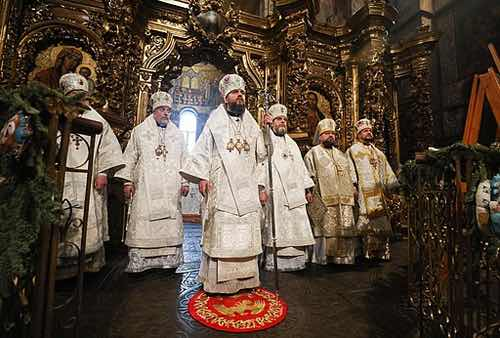
A recent Facebook post, about people in Ukraine seeking to celebrate Christmas in a united way on the same day this year, sent me exploring the maze of Christian calendars.
About 2/3 of Ukraine is Orthodox; 10% is Catholic; 10% is other Christians.
Orthodox traditionally follow the Julian Calendar (which has every fourth year as a leap year). The planet’s majority calendar is the Gregorian Calendar (in which a century is only a leap year when divisible by 400 – obviously, every four hundred years, the Julian calendar gets out of step with the Gregorian by another three days). Gregorian 1900 was not a leap year, Julian 1900 was.
Julian December 25, 2022, hence, falls in the Gregorian Calendar on January 7, 2023.
The Revised Julian calendar, proposed in 1923 by the Serbian scientist Milutin Milanković, is a more accurate alternative to both Julian and Gregorian calendars. Centuries are only leap years if, after dividing by 900, there is a remainder of 200 or 600. Do the Maths: other centuries may differ, but from 700 to 2700 (inclusive) the Gregorian and Revised Julian Calendars are identical! The next time they disagree: 2900 is a leap year in the Revised Julian Calendar, but not in the Gregorian Calendar.
The synod also proposed the adoption of an astronomical rule for Easter: Easter was to be the Sunday after the midnight-to-midnight day at the meridian of the Church of the Holy Sepulchre in Jerusalem (35°13′47.2″ E or UT+2h20m55s for the small dome) during which the first full moon after the vernal equinox occurs. Although the instant of the full moon must occur after the instant of the vernal equinox, it may occur on the same day. If the full moon occurs on a Sunday, Easter is the following Sunday. Churches that adopted this calendar did so on varying dates. However, all Eastern Orthodox churches continue to use the Julian calendar to determine the date of Easter (except for the Finnish Orthodox Church and the Estonian Orthodox Church, which now use the Gregorian Easter).
Revised Julian calendar
But wait, there’s more! As well as Gregorian Calendar Christmas 25 December, and Julian Calendar 25 December, hence, falling on Gregorian Calendar January 7, to make things even more complex, 25 December is not historically the earliest celebration. What we now would call the Epiphany, January 6, was celebrated in the early church before 25 December became widespread. Armenians continue to focus on January 6 – those Armenians using the Julian Calendar, end up with January 19 (Gregorian Calendar) as the focus of their Christmas celebration (read more off this site here).
Returning to where I began this post: the Revised Julian Calendar has been adopted in Ukraine; it has not been accepted by the Russian Orthodox Church. 7 January has been a public holiday in Ukraine. Since 2017, Gregorian Calendar 25 December is also an official government holiday in Ukraine. On October 18, 2022, the Orthodox Church of Ukraine decided that dioceses can hold Christmas services according to the Revised Julian calendar, i.e. on the same day as Western Christianity. (Read more about this off this site here; and a useful calculator to convert calendars is here.)
In 2025, it is 1700 years since the calculation of the date of Easter was agreed to at the Council of Nicaea. That is also a year in which the calculations for Easter Day result in celebrating on the same day! Might it be possible to come to agreement by then, and from then on celebrate on the same day? [Yes – knowing Christians – there will be two further remnant ways of calculating alongside the new-agreed system.]
Read more about calculating the date for Easter.



Some very complicated calculations here, and I’m not sure I follow.
However, like you, I was aware of moves in Ukraine to standardise the date of Christmas and make it 25 December. This is part of the understandable rejection of all things Russian and general looking westwards,